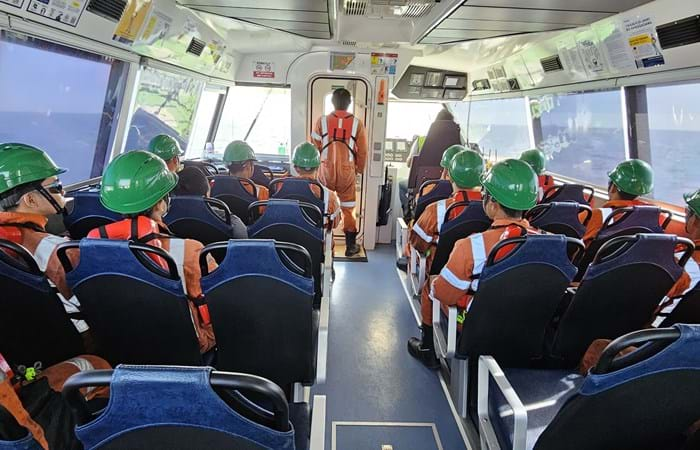As a key part of our Manila International Airport Project in the Philippines we have delivered several programs focused on local capacity-building and skills development that provide people from nearby communities with a steppingstone to future career opportunities.
The Philippines has a strong maritime history and accounts for more than 40% of working seafarers worldwide. From the project’s outset, Boskalis saw an opportunity to select several people from local fishing communities in Manila Bay to receive training to become seafarers and, in 2023, we successfully launched the Seafarers Training Sustainability Initiative.
The training is explicitly aimed at fisherfolk living in affected communities in the province of Cavite and seeks to provide them with new skills and career opportunities within the maritime sector. The training program was designed by Boskalis’ environment and social management team, with subsequent on-the-job training on board Boskalis’ vessels and those of our maritime partners in the Philippines. It is run in partnership with the Global Maritime Training Center, a recognized maritime training organization in the Philippines.
Over five months, 34 candidates completed modules in safety and security, medical first aid, anti-piracy, passenger ship crisis management, rescue boat operations and management, and deck watchkeeping. They also received training in maritime communication in the English language, enabling them to communicate effectively with fellow crew members and third parties involved in port and maritime operations. On completion, the candidates received the relevant certificates and their Seaman’s Book.
“We are really proud to have designed and implemented this program for upskilling local fisherfolk that enables them to develop their natural affinity with the sea and acquire this formal seafarer qualification,” explained Boskalis Nautical Superintendent Michael Agrazal. “Through this program they are not just benefiting from the capacity-building and experience Boskalis can provide, but also from starting out on a well-established career path here in the Philippines and the future employment opportunities that can offer.”
Boskalis has applied its approach to social management over the course of the project to determine its implications in the provinces of Cavite and Bulacan, which are home to local fishing communities. We have intensified our engagement with, and support for these communities in line with our ambition to minimize disturbance and enhance the positive impacts we can deliver.
Through active engagement with the fisherfolk, Boskalis identified the needs of those affected by the project and tailored a program to meet their specific circumstances. At the same time, the program serves to complement other community initiatives being developed, including a local entrepreneurship program executed by our client. Besides the professional and economic opportunities, it presents for the fisherfolk, the seafarer program has also helped to build people’s trust in the project and develop stronger relations between communities and the project stakeholders.
“In our long-running dialogue with residents, the first step was to understand how the project affects people’s daily lives. From there we could work closely with the different communities to devise positive interventions that are both necessary and shaped by the people themselves,” explained Sylvia Ernest, Social Manager at Boskalis. “This has had a positive effect on how local people view the project and has helped develop a mutual sense of trust between the fishing communities living here and Boskalis and its client who are delivering the project.”
The Seafarers Training Sustainability Initiative follows previous training and skills development that Boskalis conducted with communities, including in the nearby province of Bulacan in 2022. Over 100 trainees completed a traineeship for Articulated Dump Truck operators and were later employed by Boskalis on the project. In total, more than 500 individuals from the local community in Bulacan have been recruited for positions as laborers, welders, and plant operators over the last two years.
